- Expert advice/
- Wedding planning 101/
- Wedding day/
- How to Write Wedding Vows: A Complete Guide
- Wedding day
How to Write Wedding Vows: A Complete Guide
Writing your own wedding vows is one of the best ways to add a romantic and intimate touch to your wedding day. We’ll guide you through the process from start to finish, plus provide templates to help you get started.
Last updated March 12, 2025
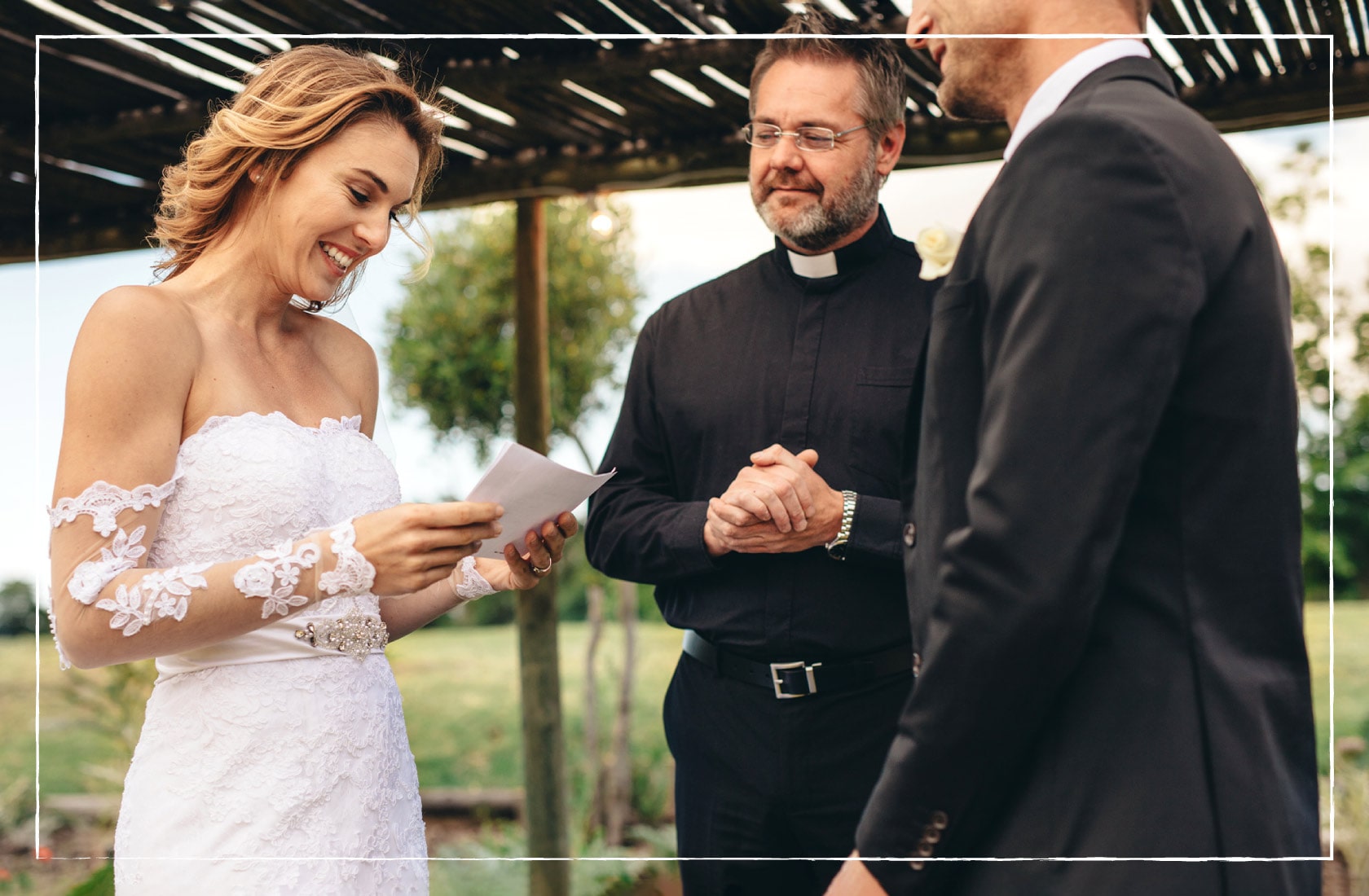
TLDR
- Just start writing your vows, and don't expect a final draft on the first try.
- Include elements like your personal story, what you love about your partner, and your hopes for the future.
- Be genuine and true to yourselves as a couple when writing and saying your wedding vows.
Your wedding day is approaching, and you've decided to write your own vows. Congratulations! You're about to embark on a journey that will make your ceremony uniquely yours. But as you sit down to put pen to paper, you might find yourself staring at a blank page, wondering where to begin. Don't worry—you're not alone. At Zola, we've helped countless couples navigate the beautiful, sometimes challenging process of writing their own vows. Let's dive into how you can create wedding vows that are as special as your love story.
How to get started writing wedding vows
Consider your personal story.
Wedding vows are more than just words. You’re making promises to your partner to serve as the foundation of your marriage. When choosing to write your own vows, you can express your love and commitment in a personal way. So, it’s perfectly appropriate to include your love story and personal anecdotes in your wedding vows.
Personal vows have the power to:
- Create a memorable moment during your wedding ceremony
- Reflect on your relationship and experiences
- Set the tone for your marriage
- Provide a mental keepsake as you reflect on your vows in the future
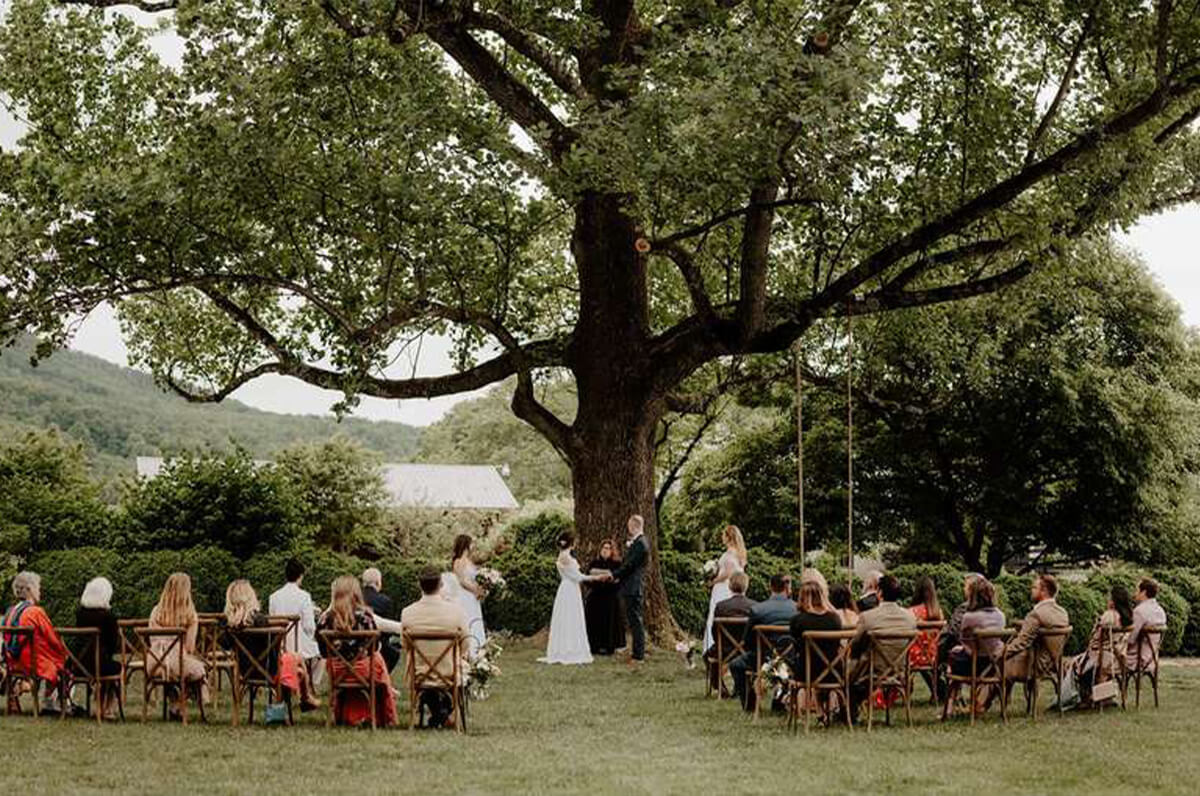
Just begin writing.
Feeling a bit overwhelmed is normal. As you sit down to write your vows, you may not even know where to begin as you stare at your paper or computer screen. After all, how do you express your love and commitment in just a few short paragraphs?
If you find yourself at a loss, here are some tips to get those creative juices flowing:
- Start with a brainstorming session.
- Write down key memories in your relationship.
- List the qualities you love about your partner.
- Jot down promises for the future.
- Consider your shared values.
Also, don’t expect perfection on the first try. Just getting your thoughts down can be a starting point to help you curate and finalize your vows later on.
Find (and use!) your voice.
Your wedding vows should sound like you, not some lofty scene from a romantic film or work of poetry. Let yourself shine through, and be genuine about it. See what styles speak to you below and use some of the sentence starters to form your personalized promises to your partner.
- Romantic - heartfelt and emotional style, "From the moment I met you, I knew my life would never be the same..."
- Humorous - light-hearted style with personal jokes, "I promise to always let you have the last slice of pizza..."
- Traditional - incorporates classic vow elements, "I take you to be my lawfully wedded spouse, to have and to hold..."
- Modern - contemporary and personalized style, "I choose you, today and every day, to be my partner in adventure..."
Pick a style that feels natural to you, and build from there. Don't be afraid to mix and match elements from different styles.
As you work on finding your voice, remember that authenticity is key. Your partner fell in love with you, not a scripted version of you. Let your true personality shine through in your vows. That could mean including humor, stories, or emotions.
Use inspiration from your relationship to craft your vows.
If you truly want to add a personal touch, include elements of your relationship. Here’s how to start:
- Reflect on your first date or the moment you knew they were "the one."
- Think about the challenges you've overcome together.
- Consider special inside jokes or quirky habits.
- Recall meaningful conversations.
- Draw inspiration from your favorite love songs, poems, or quotes.
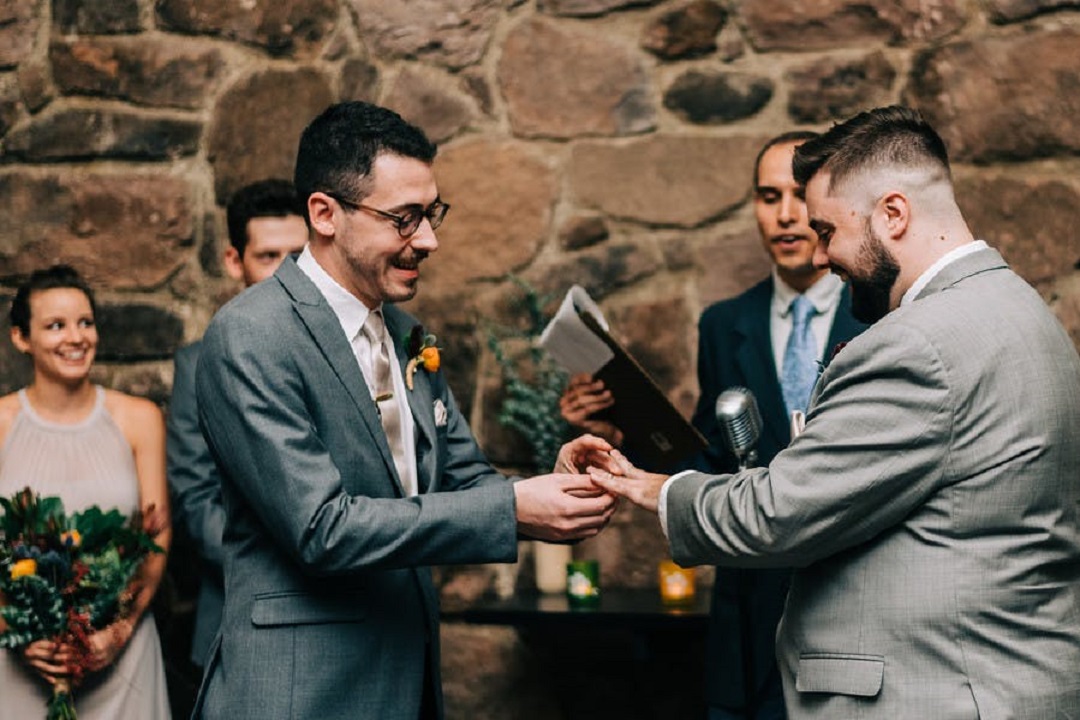
Step-by-step guide on how to write wedding vows
Now that you’re a bit inspired, Zola’s team of experts has ideas on how to craft the perfect vows. Follow along each step of the way.
1. Create an outline for your vows.
Creating a framework can help organize your thoughts and ensure you cover all the important elements. there's no one-size-fits-all template, but here’s a basic outline for your wedding vows.
- Address your partner
- Express your love and gratitude
- Share a meaningful memory or moment
- Make promises for your future together
- Thoughts about the journey ahead
- Personal touches as you see fit
The structure is a starting point, which you’ll refine later on. Just write what comes to your mind first, and create something that feels authentic. Also, consider the overall tone you want to convey. Are you going for heartfelt or do you want something to incite laughter? And, yes, it’s perfectly ok to blend both.
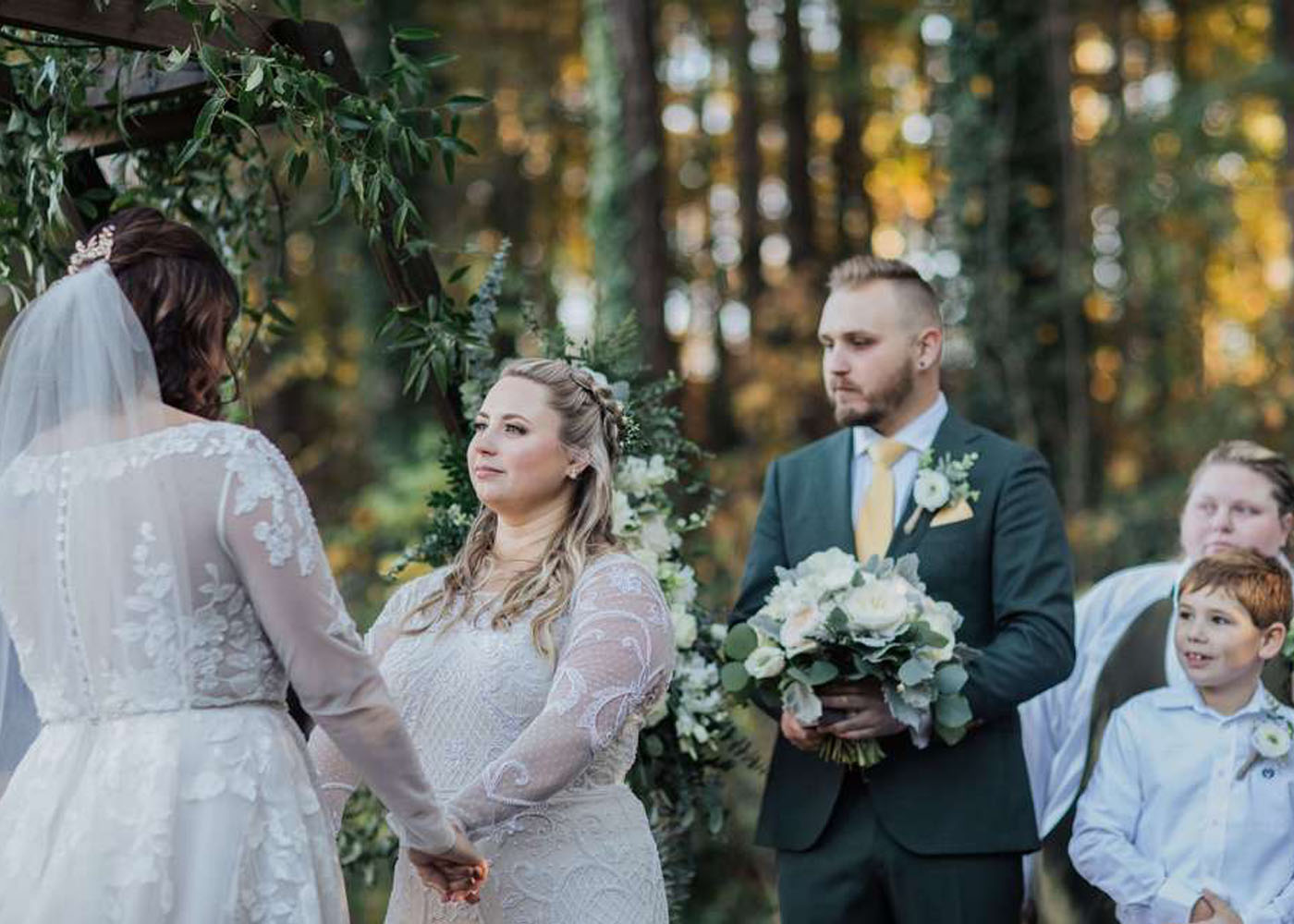
2. Write from your heart.
The most impactful vows are born out of genuine emotion and personal experience. Use this opportunity to express your deepest feelings and commitment. Don't be afraid to be vulnerable.
Stumped? Try the following writing prompts:
- Describe the moment you knew your partner was the one: "I knew you were the one when..."
- List three qualities you admire most in your partner: "Your kindness, humor, and strength inspire me daily..."
- Share a challenge you've overcome together: "When we faced [challenge], I realized..."
- Imagine your life together in 20 years: "I can't wait to grow old with you and..."
As you write, focus on the details that will bring your words to life. Instead of saying "I love you," describe how your partner makes you feel or the specific actions demonstrating their love for you. This level of detail creates a more vivid and memorable experience. Feel free to incorporate tidbits like jokes, quirks, and other touches that will make your partner smile.
3. Polish your wedding day vows.
Once you've poured your heart onto the page, it's time to fine tune your words. Here are a few tips on how to edit your vows:
- Read your vows out loud to see how they flow and catch any awkward phrases.
- Cut out any unnecessary words to make your vows more powerful.
- Vary the length of your sentences to include short statments with longer ones.
- Replace weak verbs with more descriptive ones.
- Ask a trusted friend—who knows both you and your partner well—for feedback.
As you edit, keep in mind the length of your vows. While there's no strict rule, most wedding vows are between 1-2 minutes when spoken aloud. This usually translates to about 150-250 words. Time yourself reading your vows to ensure they fit within this range.
Do's and don'ts for delivering vows:
- Do practice reading your vows aloud several times
- Don't rush through your words – speak slowly and clearly
- Do make eye contact with your partner
- Don't worry about memorizing your vows perfectly – it's okay to have them written down
- Do take a deep breath before you begin to calm your nerves
- Don't be afraid to show emotion – tears are natural and beautiful
If you're feeling nervous about delivering your vows, practice reciting them in front of someone who can offer input.
Vow writing resources
Still feeling uncomfortable? Here are a few resources that know how to write wedding vows (and help with delivery, too!):
- Vow writing services (e.g., Wedding Words, XO Juliet)
- Public speaking coaches specializing in wedding vows
- Wedding planners with experience in personalized ceremonies
- Online courses on vow writing and delivery
How to get creative with writing your wedding vows
Consider alternative vow formats.
Just because speaking your vows is traditional doesn’t mean you can’t do something else. If you’re afraid of public speaking or just want to show how unique your love story is, peek at the ideas below. Some can even be used in conjunction with spoken vows to enhance the experience.
- Video vows - Pre-record your vows and play them during the ceremony
- Musicalvows - Write and perform a song for your partner
- Letter exchange - Write letters to each other and read them privately before or after the ceremony
- Vow art - Create a visual representation of your vows (e.g., painting, photo collage)

Tailor your vows to your unique situation.
Your wedding vows should reflect your specific journey while also showcasing the feel of your big day. Below are some vow ideas for specific relationships and ceremonies.
- Having an elopement? Focus on the intimacy and the adventure of your private commitment.
- Getting married for the second (or third) time? Acknowledge your shared history and the wisdom gained from past experiences.
- Part of a LGBTQ+ couple? Celebrate your love story and the significance of your union.
- Making a blended family? Include promises to stepchildren and recognize the joining of families.
Remember, there are no rules when it comes to personalizing your vows. Most importantly, they should authentically represent your love and commitment.
Ready to start writing your own wedding vows?
We here at Zola are ready to help you curate your dream wedding day, which of course includes knowing how to write wedding vows that will make your partner blush, tear up, laugh—or all three! Our guide should help you write vows that are a reflection of your love story in an authentic way. If you’re looking for more ways to personalize your wedding day, Zola has expert advice on everything from selecting your wedding party to curating a wedding registry, so stay around for a while.
Up next for you
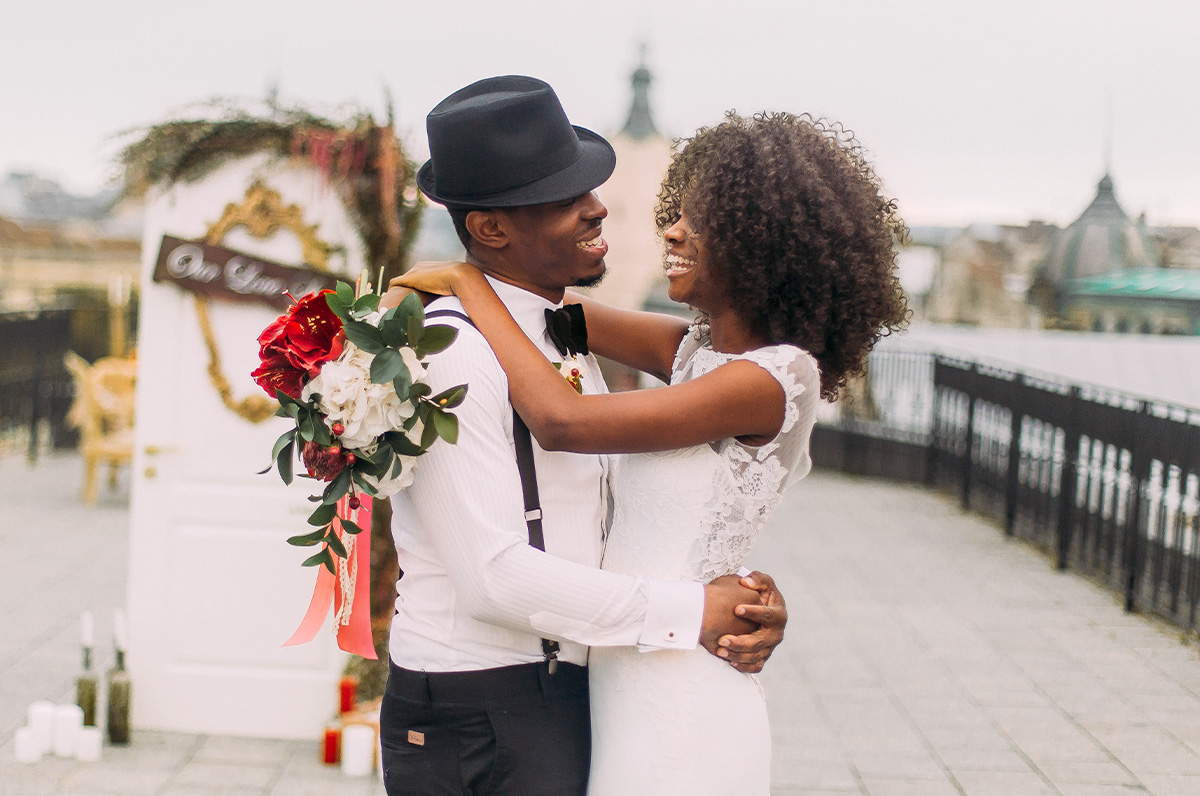
A Guide to Wedding Vows
Inspiration
Learn all you need to know about wedding vows and use our flowchart to determine whether you should write your own—plus find tons of examples of traditional vows to inspire you.

How to Write a Wedding Toast: The Ultimate Guide
How-To
Wedding toasts are tricky. We’ve got some helpful tips to guide you towards a great wedding toast that you and your favorite couple will remember fondly for years, so grab your notepads and get ready for some key(note) advice.

What to Include on Your Wedding Website + How to Write It
How-To
Your wedding website is a key place to communicate with your guests and share pertinent information, so it’s important to write well to avoid confusion. Keep reading for writing tips, wording samples, and a breakdown of what to include in each section of your wedding website.

How to Become a Wedding Officiant
How-To
Thinking about becoming a wedding officiant? Follow these 5 steps to make it official.
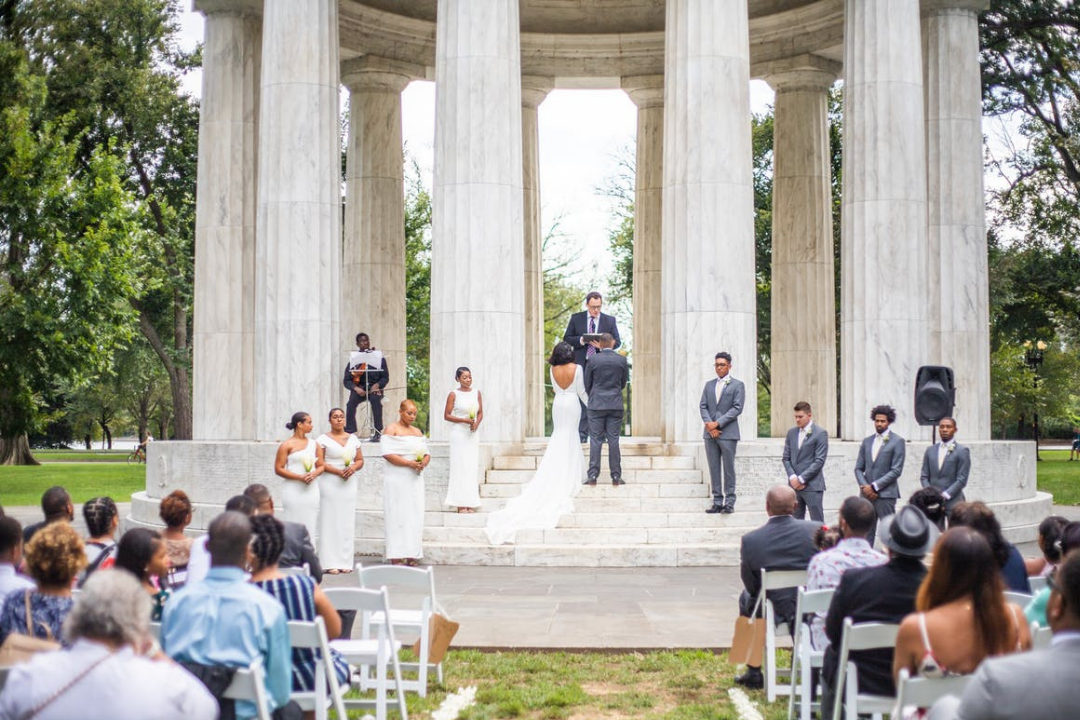
The Duties of a Wedding Officiant
How-To
Find out everything you need to know about wedding officiant duties with this informative guide. Read on for more.

2024/25 Printable Wedding Planning Checklist & Timeline - Zola
Don’t miss a wedding planning detail with our complete, expert-crafted wedding checklist and timeline. Free, printable version inside!
Featured

How to Plan a Wedding: A Step-by-Step Guide
How-To
We’ll walk you through the steps of online wedding planning, highlighting all of Zola’s incredibly easy and intuitive online wedding planning tools that’ll make planning for the big day more fun and less frustrating.
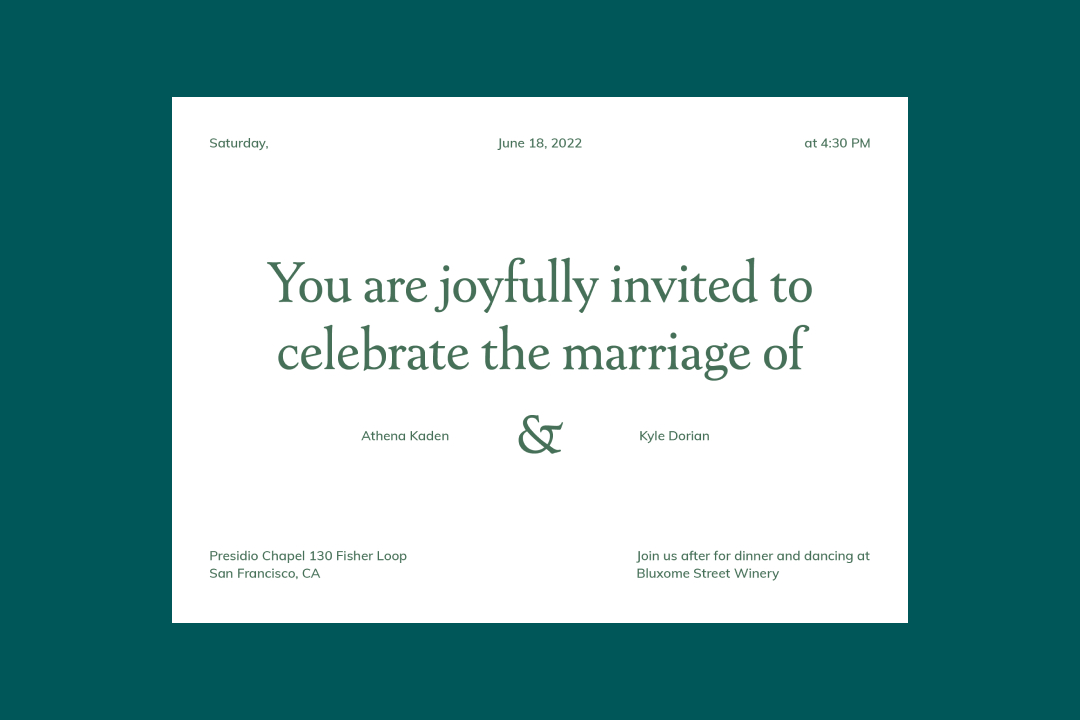
Wedding Invitation Wording: A Complete How-To Guide
How-To
Learn the how-to's of wedding invitation wording, plus formal and casual wedding invitation examples from the experts.

A Guide to Bridal Showers
Inspiration
This bridal shower guide will introduce you to the basics of bridal showers: traditional bridal shower etiquette (and which of those “rules” you can break), whom to invite, what to do, and who pays for it all.

What Is a Registry (And Why Do You Need One)?
Inspiration
A wedding registry is a personalized collection of gifts that an engaged couple has specifically chosen for their guests to shop from in order to make the wedding gifting experience simpler, easier, and more satisfying for everyone.

Wedding Cake Cost Guide: Average Price and Budget Tips
Advice
Wedding Cake Costs: Discover the national average of $917, typical range of $700 to $1,100, and smart ways to save on your wedding dessert.

Wedding Guest Attire: A Guide to Every Dress Code
How-To
Dress to impress! Your go-to guide for wedding guest attire, from formal to casual. Find the perfect look for every dress code and celebration.
- Expert advice/
- Wedding planning 101/
- Wedding day/
- How to Write Wedding Vows: A Complete Guide
Find even more wedding ideas, inspo, tips, and tricks
We’ve got wedding planning advice on everything from save the dates to wedding cakes.
